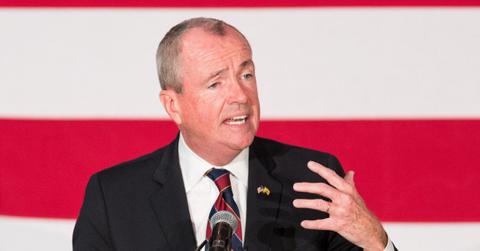N.J.'s Acting Governor Declared a State of Emergency, but Where Is the Governor?
The lieutenant governor is currently serving as the acting governor.
Published April 24 2025, 11:28 a.m. ET

Although governors are responsible for running the government of their state, that doesn't necessarily mean that they have to be in that state at all times. Like everyone else, governors are allowed to take vacations or travel out of state for meetings or other opportunities.
On April 23, acting Governor Tanesha L. Way took a number of actions in the state of New Jersey on behalf of Governor Phil Murphy. Following the news that Way was acting governor, many wanted to know more about why New Jersey has an acting governor to begin with. Here's what we know.

Why does New Jersey have an acting governor?
Like every state, New Jersey has an acting governor so that the state government is not without a leader in emergency situations. Acting governors might be invoked if the sitting governor is incapacitated (they might be in the hospital) or when the sitting governor is out of the state, either on vacation or in a situation where they cannot be on the ground. In almost all circumstances, the acting governor will be of the same party as the sitting governor.
Usually, the duties of acting governor fall to a state's lieutenant governor, but like the presidency, the chain of succession extends far past the lieutenant governor so that the office is never left unoccupied. After the lieutenant governor comes the president of the state Senate, then the speaker of the state's General Assembly, then the state's attorney general, and then the transportation commissioner.
Why does New Jersey have an acting governor in April of 2025?
Although Way could become acting governor for all sorts of reasons, she is currently serving in that role because Murphy is in Poland for Holocaust Remembrance Day. He will take part in an international march on April 24 and will likely return to New Jersey shortly thereafter. This international trip is a perfect example of why it's important for New Jersey to have an acting governor who is on the ground in their state.
Acting governors usually try to act as the sitting governor would.
Even in the rare instances when the acting governor might be of a different party than the person they are stepping in for, there is an unwritten political rule that acting governors should act as they believe the sitting governor would. The same is true on the national level, with vice presidents stepping in to act on behalf of the president they're serving trying to reflect their will.
The only time a lieutenant governor might replace a sitting governor for a long stretch of time is when the sitting governor dies or resigns. In those instances, the lieutenant governor becomes the sitting governor and is no longer serving in an acting capacity. Acting governors only exist for circumstances where the sitting governor will be able to return to their post, but are away for one reason or another for a specific, usually short period of time.